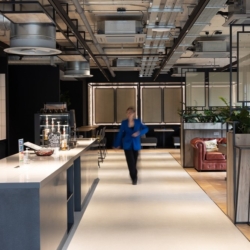January 21, 2024
Senator Group opens new showroom in Dubai
 Dubai has long been the destination of choice to showcase the most iconic of British Designs, and now it is the home to The Senator Group’s newest showroom. The 3700 square foot space is nestled in Dubai’s Marina Plaza, a 28-story tower with panoramic views of the marina, city, and desert. Visitors to the showroom will fully experience, ‘The Social Office’, which blends the Senator and Allermuir brands to create a fluid and flexible contemporary working space. The concept was developed to address the challenges of every organisation, how can we align people and space efficiently, to nurture productivity and culture? How can we create human-centred environments with the right mix of focus, privacy, and collaboration? (more…)
Dubai has long been the destination of choice to showcase the most iconic of British Designs, and now it is the home to The Senator Group’s newest showroom. The 3700 square foot space is nestled in Dubai’s Marina Plaza, a 28-story tower with panoramic views of the marina, city, and desert. Visitors to the showroom will fully experience, ‘The Social Office’, which blends the Senator and Allermuir brands to create a fluid and flexible contemporary working space. The concept was developed to address the challenges of every organisation, how can we align people and space efficiently, to nurture productivity and culture? How can we create human-centred environments with the right mix of focus, privacy, and collaboration? (more…)









 While millions of words have been dedicated to the expected changes in post-Covid workstyles – how will people work, where will they work, how will they be supported – very little has been said about their employers: companies and corporations. Yet the anticipated changes to work and the workplace raise questions about the role of the company. Is it one just half of a transaction between employer and employee? Or is it something more? Indeed, what is the role of the company in the modern economy? Is the nature of the company likely to change? The answers could have a greater impact on workstyles than the pandemic.
While millions of words have been dedicated to the expected changes in post-Covid workstyles – how will people work, where will they work, how will they be supported – very little has been said about their employers: companies and corporations. Yet the anticipated changes to work and the workplace raise questions about the role of the company. Is it one just half of a transaction between employer and employee? Or is it something more? Indeed, what is the role of the company in the modern economy? Is the nature of the company likely to change? The answers could have a greater impact on workstyles than the pandemic. 























November 29, 2023
Creating the epicentre: unlocking the untold benefits of next-generation office spaces
by Nathan Thomas • Comment, Flexible working, Property, Technology